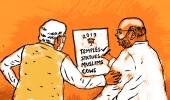Unlike other countries, the US does not send its election observers to India because of the strong independent credentials of the Election Commission of India.

The United States on Wednesday said that it was confident in the fairness and integrity of the Indian elections and would work with whoever is the victor.
"I would say from the US perspective, we are very confident in the fairness and the integrity of the Indian elections, and we will obviously work with whoever is the victor and whatever the outcome is there," State Department spokesperson Morgan Ortagus told reporters during an off-camera gaggle in Washington.
Unlike other countries, the US does not send its election observers to India because of the strong independent credentials of the Election Commission of India.
"We have a very strong relationship and a lot of cooperation with the Indian government on a full range of issues, and the Secretary (of State, Mike Pompeo) has said numerous times that we have a true strategic partner in India," Ortagus said in response to a question.
The diplomat praised India and its people for carrying out such a massive exercise peacefully, describing it as fascinating. "Someone pointed this out to me today that India's election is the largest exercise in democracy in human history," she said.
"I think with everything going on in the world, that's a thing that we can pause and think about and certainly commend the Indian people," Ortagus added.
The Washington Post had on Wednesday said that the Indian election was the largest democratic exercise in the world.
"With about 900 million eligible voters, the size of the electorate had swelled by more than 80 million compared to 2014. In that election, 550 million people ultimately cast votes," it had said.
Richard M Rossow, Wadhwani Chair in US India Policy Studies at the Center for Strategic and International Studies think-tank, said the next Indian government will have a difficult time managing ties with the United States.
"A dual-track approach is quite clear: Continued progress in deepening our security relationship while simultaneously engaging in a wider trade fight," Rossow said.
"Too often this trade fight is attributed mainly to the United States. This is unfair, as the Modi government took significant steps to slow imports in recent years, such as increasing customs duties and initiating new local content mandates for government procurement," Rossow told PTI in response to a question.
He said while the next government in India might trigger fresh reforms early in its tenure, they are likely to be more focused on attracting foreign investment rather than taking steps that could increase imports.
"Investment-oriented reforms are unlikely to assuage US trade policy concerns. So this dual-track approach is likely to persist post-election," Rossow added.
A New York Times editorial piece said the election had become a sweeping referendum on the last five years of governance by Narendra Modi, the country's dominant and divisive prime minister.
It is also likely to be the world's most expensive elections, with parties estimated to have spent a total of as much as USD7 billion, it read.
"During the campaign this year, Mr. Modi's Bharatiya Janata Party seemed to intensify its Hindu right-wing rhetoric. Whether voters reward or punish that choice will be one of the most important takeaways from the biggest elections in the world," the NYT said.
According to The Washington Post, the result of this election will be pivotal to the future of India, soon to become the world's most populous nation.
"India is attempting to catch up in economic terms with China, its neighbour to the east, a pursuit that requires massive investment in infrastructure and significant policy change. At the same time, the country is also deciding what kind of democracy it wants to be, having embraced a Hindu chauvinist leader by a landslide in the last national polls in 2014," the daily said.
In a news dispatch from New Delhi, The Wall Street Journal reported that Prime Minister Narendra Modi appears on track for a second term if exit polls bear out, "but less clear to investors and executives is which version of Mr Modi would take charge: the business-friendly leader or the divisive nationalist."










